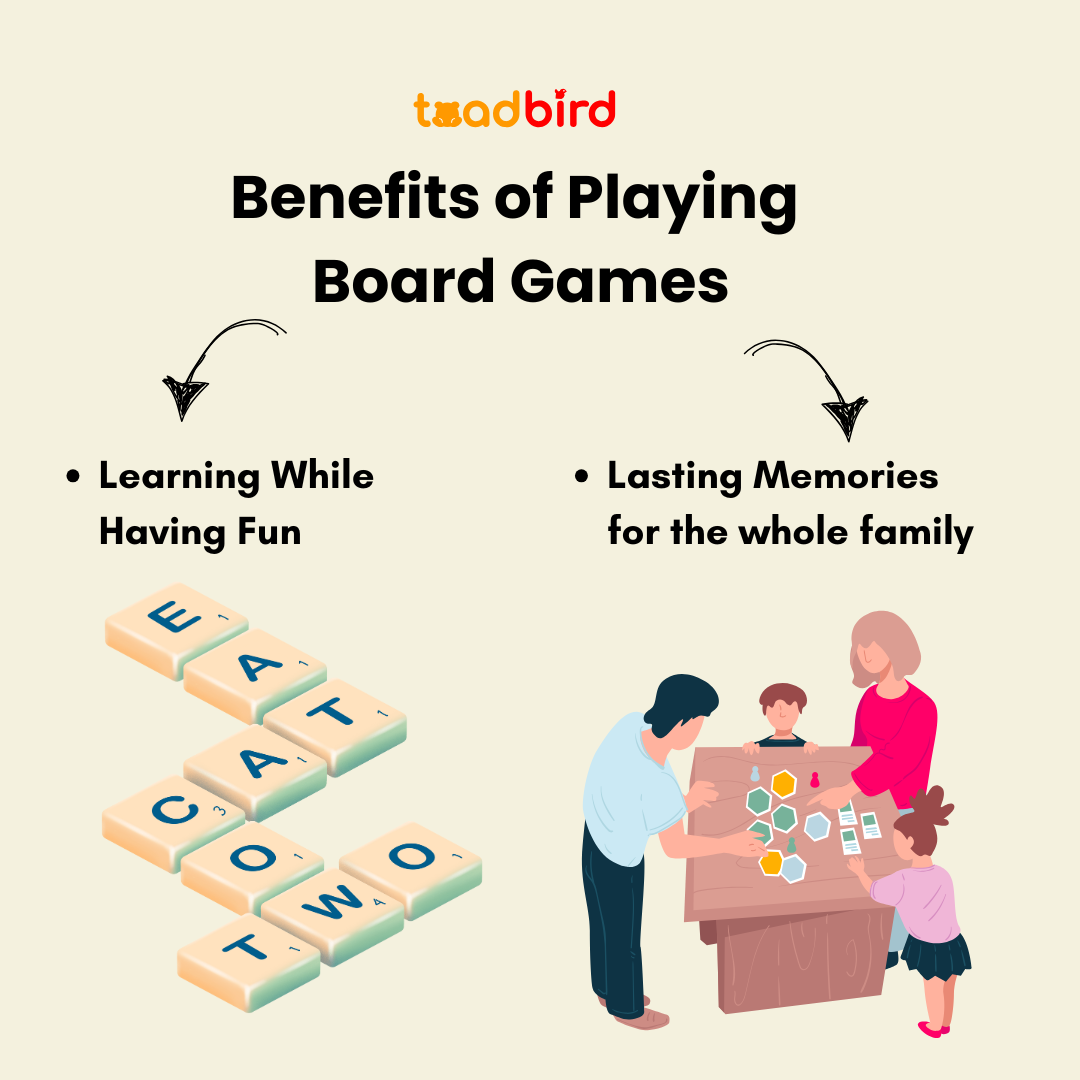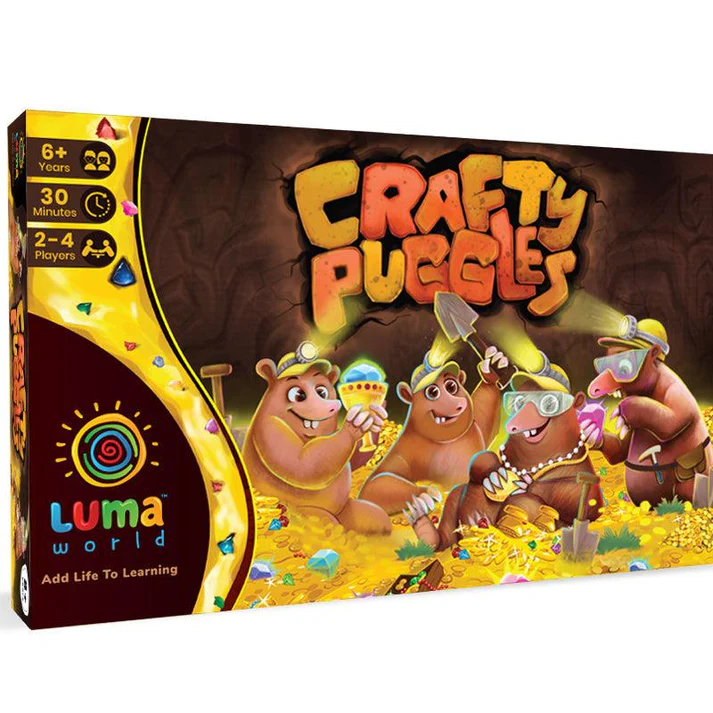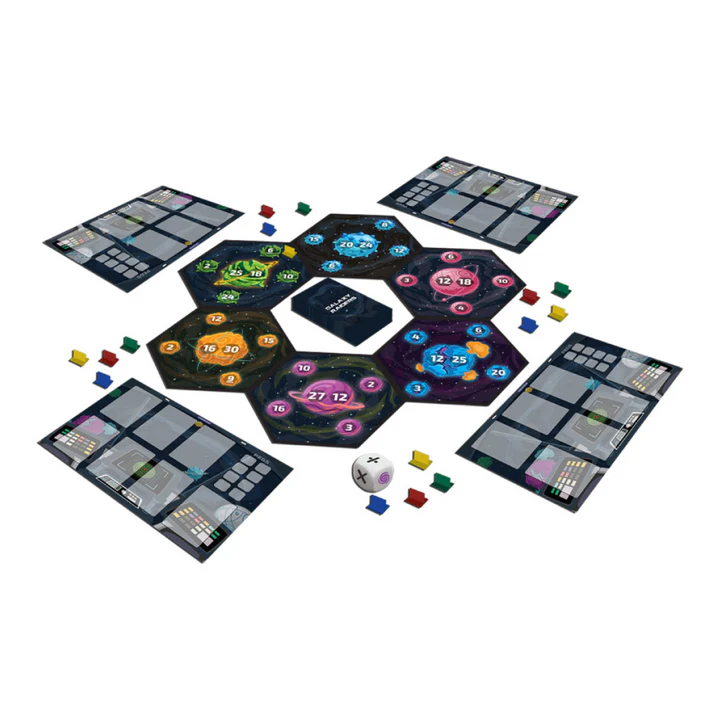Family Bonding: Why Board Games Are the Perfect Activity to Strengthen It
Zeba ParkarShare
We are all worried by how fast our little ones grow up. As the child grows and makes more buddies and friends in the world around them, you begin to wonder if they'll leave you, and that always makes you cringe. But as parents, you are looking for ways through which you may deepen your love with your child in a way where they see you not as someone in authority, but as a best friend. And let's face it: in today's world of smartphones, streaming platforms, and endless digital distractions, quality family time can feel like a rare treasure. But the need for that bonding has never been greater. It's what keeps our relationships strong, fosters open communication, and ensures our kids feel secure in their family unit.
The more the years went by, I learned that board games are among the best ways of bringing together the whole family in a really entertaining manner. Be it just rolling the dice with toddlers or working out intricate strategy games for the adults, the board games allow us to enter a special place where we share laughter, play, and cooperate towards the realization of a common goal. These games are not only endless fun but also offer moments to connect on a deeper level, creating memories that last far beyond the final roll of the dice. Let's explore why playing games isn't just about fun — it's also one of the best ways to strengthen family dynamics and build lasting bonds.
The Importance of Family Bonding
Family bonding is indeed the core idea of trust and love, together with security for children. Through secure family relationship, children can develop their abilities to venture freely into the whole world knowing they were well taken care of by one another.
The best part is that family bonding does not have to be complicated or costly. Consistent and meaningful activities, whether simple or fun, provide the perfect opportunity for everyone to connect. Whether it's a quick board game or a shared hobby, these moments build lasting memories and foster closeness.
Quality time together enhances communication, strengthens family bonds, and creates a strong relationship between parents and children. It is in such moments that children feel heard, valued, and supported, thus able to speak out freely and without fear of judgment.
Not to mention, quality time with their loved ones imbues children with necessary life lessons. They find out how strong relationships with people around them feel as they feel them firsthand. This shared and trust-based shared experience is basically an example blueprint to help forge a meaningful, fulfilling relationship later outside the familial environment.
Even the least complicated activities give rise to a most meaningful connect. Whether to enjoy a snuggly film night with their family or spend outdoor time together, these experiences endorse the feeling of togetherness and facilitate a sense of belonging that can be vital in healthy emotional growth.
The Benefits of Playing Board Games
There is something really magical about gathering around a game table. Unlike many other activities, playing family games demands active participation from everyone. It's not just about rolling dice or drawing cards — it's about the social interactions, teamwork, and conversations that naturally emerge in between each turn. These moments are where the real connection happens.

1. Learning Through Play
Through games the kids learn how to take turns and follow rules when things do not go their way. With the older kids, it encourages them to think more strategically, decide, and also collaborate. For adults, this is a precious chance to share moments with children in ways few other activities afford. It's about having fun together, being present, and enjoying those lighthearted moments of friendly competition.
I still remember how their eyes would light up at a simple matching game when my kids were toddlers. It was a fun way to spend time and we all ended up getting engulfed in it. When they grew older, the games got more complicated, but the basic essence of that shared moment never changed. Every game was another step to the building of a stronger connection as a family, memories created which would stay longer than the last move or roll.
2. Lasting Memories for the whole family
The best memories I create with my children are those shared moments of joy, laughter, and a little friendly competition. I saw it first — the magic that occurs when we gather around a game. My kids still talk about the time they managed to beat me in a strategy game or the time we laughed until our sides hurt from playing a cooperative adventure game. And I believe it's these moments which forge those unspoken bonds.
Still, it goes beyond the greatness of the memory. These experiences lay the solid groundwork for how family dynamics get built. In many ways, board games set those storied memories down as part of our collective folklore. The internal jokes, that playful teasing, that small and minor victory - will be the storytelling gems for ages. And every time we bring out a favorite game, we add another chapter to that story, strengthening the relationship we have and continuing through the bond that goes through all the years.
Planning a Successful Family Game Night
A family game night can easily become one of those special traditions that everyone looks forward to, but it doesn’t just happen on its own. Trust me, after years of trial and error, I’ve learnt that a little planning goes a long way in making the night memorable. Here are a few tips I’ve picked up over time to ensure that your game night becomes a cherished experience.
Set the Mood: The atmosphere can make or break a game night. I’ve found that creating a cozy, welcoming vibe really sets the tone. Think comfortable seating, soft lighting, and maybe even a few candles to give that warm feeling. Don’t forget the snacks! Have a variety of easy-to-grab treats that everyone can enjoy, and consider playing some light background music to keep the energy fun but relaxed. It’s those little touches that transform the night into more than just a game — it becomes an event.
Pick Inclusive Games: One of the most important things I’ve learned is to choose games that everyone in the family can participate in. Whether you’re playing with toddlers or teenagers, everyone should feel included. Games that are simple enough for younger kids but still fun for older ones are a win. There’s something truly special about watching everyone — from the youngest to the oldest — fully engaged in the same game, laughing and competing together. Over the years, we’ve discovered games that bring us all to the table and make everyone feel involved.
Rotate Roles: In our house, every family member takes a turn to pick the game, and believe me, it makes all the difference. It's so easy to fall into routine and keep choosing the same old games, but when everyone gets a turn choosing, it just keeps the whole experience fresh and exciting. Everyone feels heard and included in the process, which can make everyone more connected to the night.
With everything in its right place and everybody being fully absorbed, game night becomes something magical. It's not just the games you play, but also the time you spend together, conversations between turns, and memories that are created. Game night then becomes a family tradition, bringing stronger family ties and leaving all of them with a smile after the final roll of the dice.
Choosing the Right Games for Your Entire Family
Let’s be real—picking the right game is crucial to a successful family game night. Over the years, I’ve learned that the key to a memorable experience is selecting games that everyone can enjoy, no matter their age or skill level.
In playing with toddlers, games with less complex rules but lots of color can be played well. Children of that age need not involve a lot of complicated strategies in them. It just requires fun mechanics, easy for a toddler to understand. These would include the kind of game memory-matching and simple counting. For example a game like Crafty Puggles would be a good fit.

Now as the children become older, games that will slightly challenge them come in handy. Strategy-based or games with some learning curve truly capture their minds and keep them engaged for quite a while. Whether it's a fun board game with competition or one with some thinking and planning, making decisions and determining the best plays is usually exciting for older children. In this case a game like Galaxy Raiders would be a good fit.


For a family with varying skill levels (such as mine, where there are always mixed ages and experience), cooperative games are a game-changer. Such games promote teamwork, which is ideal for ensuring everyone feels involved and equal. Instead of competing against each other, everyone works together toward a common goal. It's an excellent way to guarantee everyone, no matter the age, can have a share in the experience and their moment of having a feeling of belonging as a member of the team.
Not only is it keeping them entertained while picking the game, but it's also about creating some fun, engaging, and meaningful experience for the youngest player in the circle or the oldest one.
Making Playing Games a Lasting Tradition
The act of making family game night a routine is something very simple yet powerful to strengthening bonds and creating lasting memories. Set aside one evening each week for playing games, thus ensuring quality time for everyone. Each person can choose a game, and, most of all, rotate for everyone's chance to engage the whole family. Add a touch of tradition—like special snacks, drinks, or even a pre-game ritual—to make the experience feel extra special. Don't forget to include even the youngest kids in activities that match their abilities. Over time, this shared tradition can become a treasured part of your family's legacy, passed down through generations as a way to stay connected and create great memories.
Final Thoughts
Turning family game night into a beloved tradition doesn’t require perfection, just a little planning and a lot of heart. By setting a regular schedule, letting everyone take part in choosing the games, and adding those special touches—like a favorite snack or a fun new twist—you’re doing more than just creating a fun activity. You’re fostering love, laughter, and a deep sense of connection that will carry on for generations.
So grab those board games, make some snacks, and start creating memories that your family will remember for a lifetime. The best part? It's only the beginning!